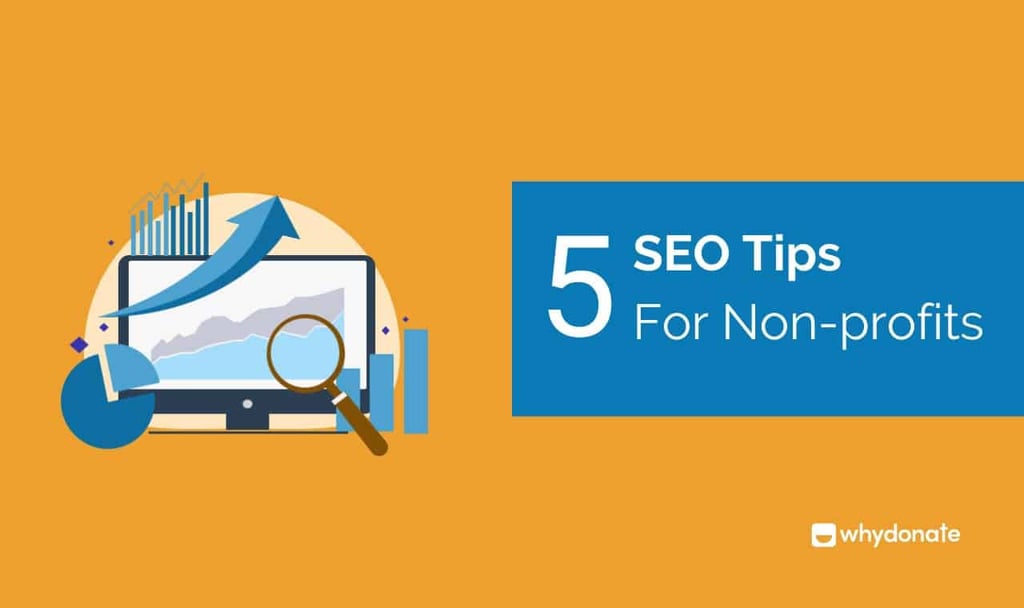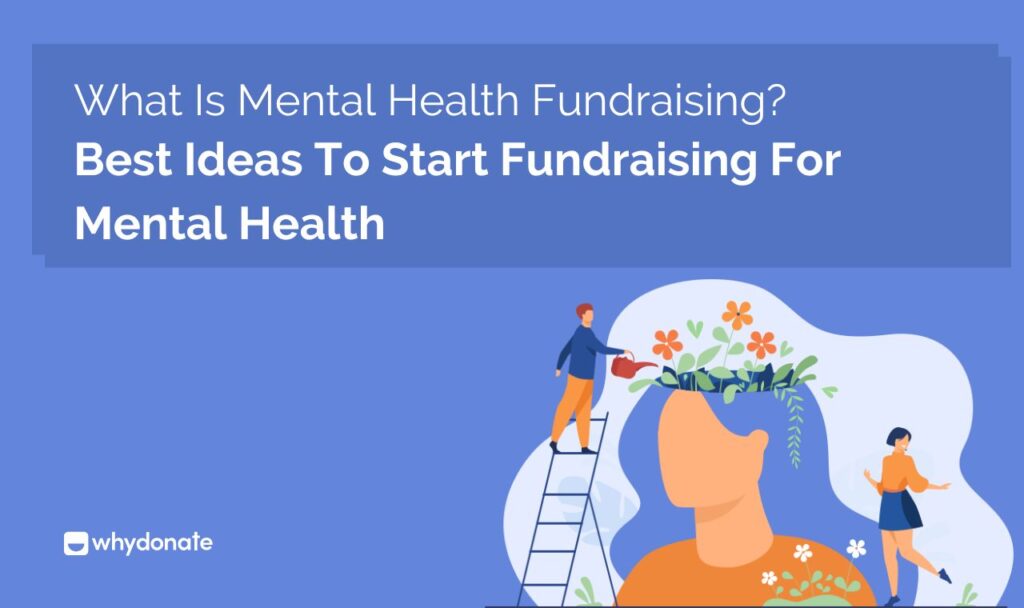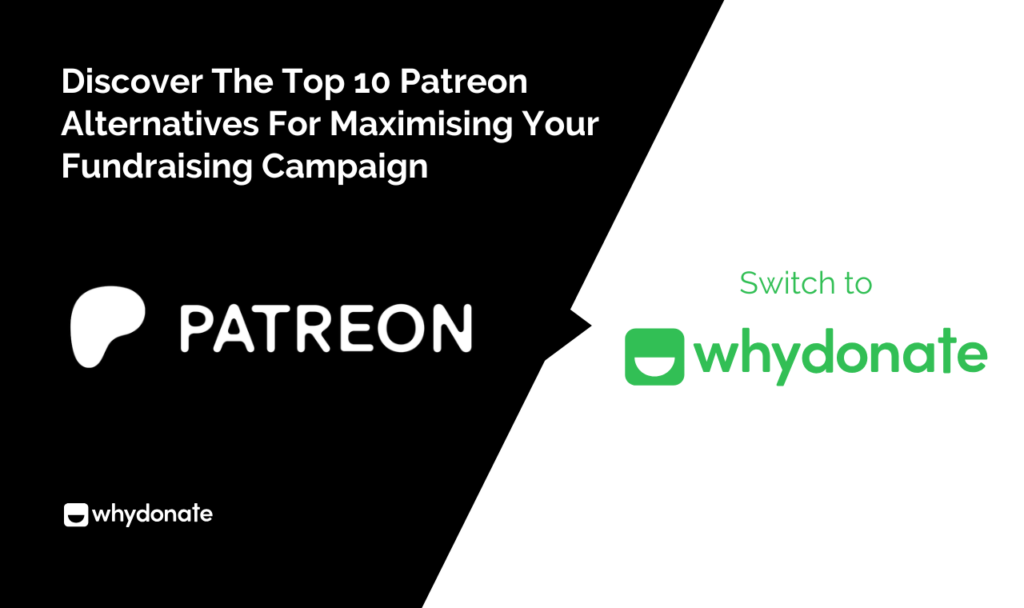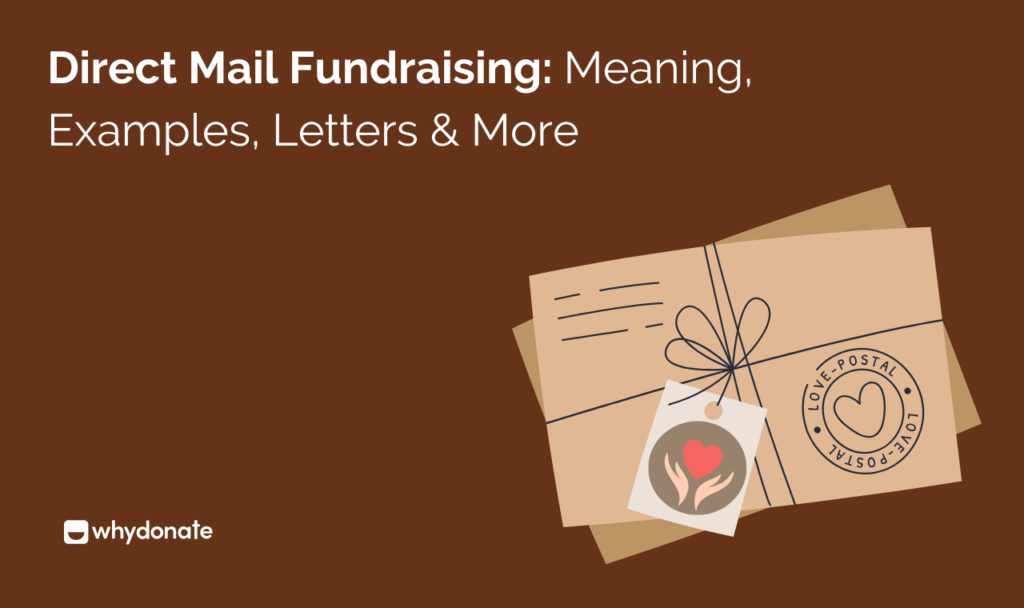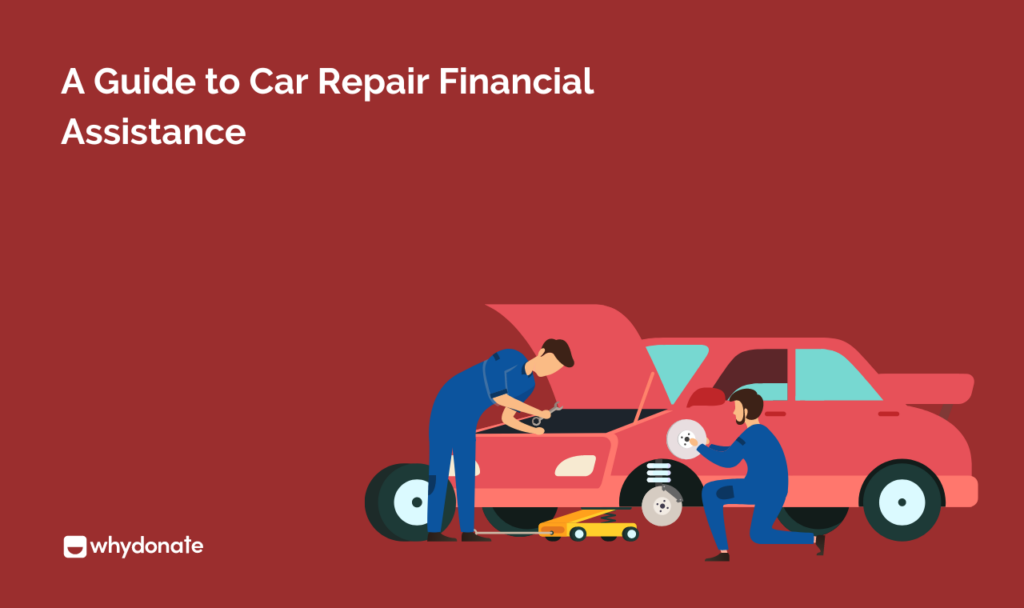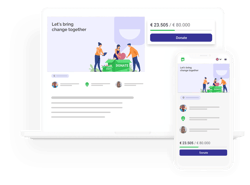If you’re reading marketing blog posts these days, you must have heard of SEO. While it may be a standard marketing buzzword, SEO is a must for virtually any organization, including non-profit organizations operating in the modern world. SEO for nonprofits is essential to rank higher on SERP.
Table of Contents
Do charities need SEO?
SEO stands for ‘search engine optimization‘. It is the process of making changes to the design and content of your website to make it appear in the search engines. This will help you get traffic from the ‘organic’ or ‘natural’ search results on search engines like Google, Yahoo or Bing.
If you’re confused or intimidated by the prospect of becoming discoverable online and all that entails, don’t worry – we’ll help you. In the article below, we will share tons of insightful and actionable SEO tips with you.
Start optimizing your charity’s website with SEO to boost your online visibility and reach more supporters! Start your fundraising campaign with WhyDonate now!

Why is SEO Important for Nonprofits?
Search engines are one of the primary ways people can find your nonprofit ‘s website. And finding your website means finding your organization, information about your services, events, and donation page. Search engine optimization refers to the process of using various strategies and techniques to rank highly on a search engine’s search results page (SERP) – including Google, Bing, Yahoo, and other search engines to increase website traffic. And a high ranking really matters.
An estimated three out of four clicks from internet searches go to the top five positions on Google. And with nine out of ten clicks (91%) from Google Search going to the results on the first page, the value of SEO is straightforward. With more and more people choosing to donate online, a high ranking is crucial to the success of an organization. Whether your goal is to raise awareness of an issue, increase online donations, or drive volunteer signups, a good SEO strategy can help you achieve that.

How Does SEO For Charities Work?
SEO does not discriminate based on your legal status. It doesn’t matter if you are a commercial or non-profit organization. SEO for charities is no different from SEO for other companies.
Search engines have two main functions: first, to crawl and build an index, and second, to provide search users with a ranked list of websites they have determined to be the most relevant.
When a person searches online, the search engine searches billions of documents (pages, PDFs, jpgs, and many more); they do two things: first, it returns only those results that are relevant or useful to the searcher’s query, and second, ranks it those results.
For example, search engines will focus on delivering relevant results to searchers by trying to understand what the site is about through keywords and display more user-friendly websites.
While search engine optimization can get quite complex when it comes to all the different factors that affect your ranking, this basic process isn’t that hard to understand.
What factors affect Google ranking?
There are over 200 factors that affect your ranking factors, but you can improve your website simply by working on a handful of them. For example, WhyDonate identified Google’s top 10 ranking factors in 2022:
- Secure Sites (HTTPS vs HTTP)
- Mobile-friendly websites
- Page Speed
- Schema Format
- Quality of the content of the web pages
- Length of webpage content
- Social and local signals
- Quality Backlinks
- Optimized images
- Domain age
How to improve SEO For Nonprofits?
1. Seo Keywords For Nonprofits
Keywords are ideas and topics that determine what your content is about. SEO is the words and phrases that searchers enter into search engines and are also known as ‘search queries’ (e.g. homeless shelter Amsterdam or animal charities). It’s essential to use the language your target audience uses as you may be describing your organization in different ways right now.
Find your keywords by talking to your customers, visiting forums and community groups and, for example, by conducting your own keyword research with a tool such as Keyword Explorer. Compile your keyword list based on this research.
Here are a few tips for charity SEO:
- Use the keyword in the title of your page, preferably as close to the beginning as possible.
- Place the keyword in the article as quickly as possible (in the first 100 words) and up to 15 times throughout the article. However, you will be penalised if you use the keyword too much.
- Use the keyword in your H1 tags.
- Place the keyword in any alt text near the image.
- Use the keyword in your meta description.
- Include your keyword or phrase in the title of the image file.
- Use long-tail keywords and use Google Trends to check what people search for.
While images and creative phrases are great, it’s safest to use simple terms people know and search for (for example, “running shoes” and not “shoes for running”) to explain what your nonprofit does.
2. Write brilliant content
In the end, it’s all about content. Especially when it comes to SEO, while using shortcuts and tricks like keyword overuse and cloaking (examples of black hat SEO ) can lead to short term results, they are frowned upon and are not sustainable.
Search engines are getting smarter every day – they want to show the most relevant results to their customers, so they’re constantly changing how they rank sites.
The only way to sustainably optimize your site is to create excellent content. Create valuable, shareable, relevant content that is valuable to your customers and answers their questions.
Here’s what you can do:
- Have each web page target a unique primary keyword. Usually, your homepage focuses on all aspects of the business. Your category pages, product pages, and articles should target more specific niche needs.
- Look at your list of SEO keywords and see what previous, in-depth posts you can use those keywords for.
- Interview experts and influencers. They probably share your content through their social channels.
- Write new, engaging, high-quality blog posts related to your work. Nonprofits have no shortage of great stories to share – showcase your beneficiaries, showcase volunteers, share videos, photos, testimonials, interviews, etc.
- Avoid or reduce aggressive pop-ups and make your images small.
- Create a variety of content (blog posts, videos, lists, infographics, tutorials, etc.).
3. Make sure that very high-quality websites link to your content
The ranking of the search engines is also determined by other sites which link to your site. The more other websites link to yours, the higher your ranking. However, links from trusted websites, which rank themselves highly, are more considered.
Backlinks are a so-called ‘off-page’ factor that influences SEO. This is how Google determines whether you have a legitimate site that visitors can trust. Trust is becoming an increasingly important factor in a site’s Google ranking.
Here are a few ways to get good backlinks:
- Ask news sites to add your website link when you are featured in a story.
- Ask your business partners and sponsors for backlinks.
- Collaborate with other nonprofits and have them a link to your website in a blog post.
- Write guest blog posts on other websites and include a backlink to your website.
- Produce great content (tip #2) that others naturally want to link to. Make it in-depth (more than 2,000 words) so that it ranks at the top of search results and people want to link to it and share it.
- Add social share buttons so that your content can be easily shared.
- Just like with keywords, don’t overdo it with backlinks. Spamming sites with your links can get your site banned from search engines.
Link building takes a lot of time and effort, but it is a crucial part of SEO. Don’t get discouraged, and keep going!
4. Optimize your website
Mobile optimization is becoming an increasingly important factor in SEO. Mobile optimization looks at site design, structure, page speed, and more.
58% of all searches in Google today are performed from a mobile device.
And this is what Google said:
“While our search index remains a single index of websites and apps, eventually, our algorithms will primarily use the mobile version of a site’s content to rank pages from that site, to understand structured data, and include snippets of those pages in our results. to show.”
Google’s Mobile-first Index ranks search results based on the page’s mobile version only.
You can do something about it this way:
- Make sure all internal links and redirects are working.
- Speed up your website. 53% of visits are abandoned if sites take more than 3 seconds to load.
- Make your website responsive – adapting design elements to the device to provide users with a great visual and browsing experience. A responsive design should provide a smooth browsing experience on any device users choose.
- Flash is not supported by most mobile (and many desktops) browsers. To ensure that Google (and its visitors) can access all the content on your site, it’s best to avoid using Flash on your mobile pages.
- User experience. Take care of the user experience. There is no need to zoom in to read the text, no pinching, buttons too close together or too small to click.
- Pay attention to the rise of voice search on mobile phones. People behave differently when searching using a search box than by voice. This behaviour requires a new kind of keyword research.
- Create accelerated mobile pages or AMPs – designed to deliver fast mobile content. An AMP is a completely stripped-down HTML version of your web page, leaving only text and images.
Expert tip: use Google’s Mobile-Friendly Test to check if your website is mobile-friendly. Use the mobile speed test to see if there are any speed issues.

5. Take the ‘little’ things seriously too
Mobile optimization, keyword research, great content and backlinks are without a doubt the most important elements of SEO. However, there are plenty of other smaller things that can help rank your nonprofit’s website.
- Don’t forget the other search engines like Yahoo and Bing.
- Add an image from Google Map to your contact page on your website. Google gives ranking priority to those sites that use its products.
- Make sure your URLs are fairly short (5 words or less), include your target keyword, and use hyphens to separate the words (no underscores).
- Create a site map. Sitemaps can be uploaded to Google’s Webmaster Tools and give Google a better understanding of the structure of your site.
- Encourage supporters to view your nonprofit on sites like Yelp, The Yellow Pages, or other online directories.
- Create a Robots.txt file. This file allows Google’s web crawlers to find and index your website while also giving the option to ignore pages being indexed.
- Move your organization to HTTPS. Google believes that all user connections between its browser and the website should be secure.
- Avoid copying content and write original copies for each page.
- Include a strategy to update certain types of content once every 12 months or so. Google loves new content.
- Make sure you have the terms of use and privacy policy pages. These two pages help tell Google that a site is a trustworthy member of the Internet.
- Include a good contact page; Google appreciates that.
- Start a YouTube channel with video content you already have: event conversations, curated testimonials, educational videos.
Are you planning to start a fundraising for your nonprofits? Try WhyDonate now for free.
Do nonprofits need SEO?
Search engines are one of the primary ways people can find your nonprofit‘s website. And finding your website means finding your organisation, information about your services, events, and donation page. Search engine optimisation refers to using various strategies and techniques to rank highly on a search engine’s search results page (SERP) – including Google, Bing, Yahoo, and other search engines to increase website traffic. And a high ranking matters.
What is SEO for nonprofit organization?
Search engines have two main functions: first, to crawl and build an index, and second, to provide search users with a ranked list of websites they have determined to be the most relevant.
When a person searches online, the search engine searches billions of documents (pages, PDFs, jpegs, and many more); they do two things: first, it returns only those results that are relevant or useful to the searcher’s query, and second, ranks it those results.
Why is SEO important for non profits?
Search engines play a crucial role in driving traffic to your nonprofit’s website, making it essential for your organisation to rank well on search engine results pages (SERPs). This process, known as search engine optimisation (SEO), involves implementing strategies and techniques to improve your website’s visibility on search engines like Google, Bing, and Yahoo. A higher ranking on SERPs is vital as it increases website traffic and helps users quickly find your organisation, services, events, and donation page.
How do I use Google for nonprofits?
To use Google for Nonprofits fundraising:
- Verify your nonprofit status.
- Access Google Ad Grants for advertising.
- Utilise Google Workspace for collaboration.
- Consider Google AdSense for website revenue.
- Explore Google One Today for donations.
- Seek assistance and resources from Google for Nonprofits.
Do charities need SEO?
Yes, SEO is vital for charities. SEO does not discriminate based on your legal status. It doesn’t matter if you are a commercial or non-profit organisation. SEO for charities is no different from SEO for other companies.
Conclusion
Search engine algorithms change quickly, so even if you’re doing your best to stay on top of nonprofit SEO, there’s always something new to learn, tweak, or try. You don’t have to be an SEO expert to improve the number of people your organization can find, so work as hard as your resources allow you to do it.
Always focus on the audience that will click and read your content and not the search engines. Focus on creating the best possible content for the website that is easy to read and navigate while also following the rules of search engine optimization. You will be well on your way to building a successful online presence for your nonprofit. Build. Keep in mind that search engine optimization takes time to work for you. It may take months to enjoy the results of your hard work, but once you do, all the effort will pay off!
Choose WhyDonate as your online donation system and check out our nonprofit blog for helpful resources and tips for nonprofits.
